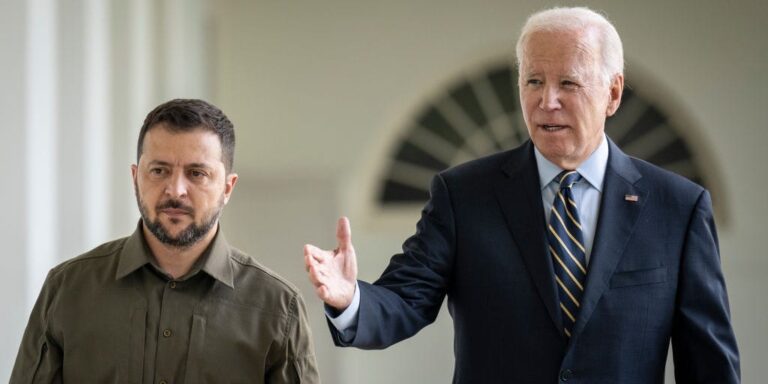- Biden rejected Ukraine’s application for NATO membership as part of the peace deal.
- Foreign policy experts said this would weaken Biden’s chances of reelection.
- Ukraine’s membership in NATO will be seen by Russia as an increase in tensions.
US President Joe Biden appears to have voiced his opposition to Ukraine’s application for NATO membership.
In an interview with Time magazine this week, the US president said he would not support the “NATOization of Ukraine”, adding that he witnessed “serious corruption” during a visit to Ukraine as vice president.
“Peace doesn’t mean NATO,” Biden said.
Rather, part of the conditions for peace in Ukraine was building relations with Kiev that included security guarantees that would lead to “we supply them with weapons so that they can defend themselves in the future.”
“Peace means making sure that Russia never, never, never, never occupies Ukraine,” Biden said.
This is a blow to Ukrainian officials who have consistently called for swift membership in NATO once the war ends.
A report in the Financial Times earlier this week revealed that Ukraine’s lack of progress towards NATO membership has become a key issue creating tension in US-Ukraine relations.
Ukraine is now hoping that a NATO meeting scheduled for July 9-11 in Washington will provide a clearer signal about Ukraine’s post-war membership.
Biden will not weaken his chances of reelection
U.S. ambassador to NATO, Julian Smith, told reporters last month that Kiev was unlikely to accept an invitation to join at a NATO summit in July, but promised to offer a security package as a “bridge” to membership.
The bridge “will be well lit and made of steel. We will do everything we can to help our friends of Ukraine cross this bridge step by step and ultimately become members of the country.”
However, a refusal to move forward with accelerating its membership plans would jeopardize Ukraine’s hopes of joining NATO.
“Biden is trying to persuade the American public that the US will stay out of the loop in order to avoid undermining his re-election chances,” Leo Ritola, a visiting fellow at the European Council on Foreign Relations, told Business Insider.
“Nobody in NATO, especially in the United States, wants to test Article 5,” Ritola said, referring to Biden’s comments in Time magazine.
NATO’s Article 5 upholds the principle of collective defense and would oblige the United States and Western countries to commit military forces to the defense of Ukraine.
For now, Ukraine will have to content itself with various “security guarantees.”
Ukraine has signed 15 bilateral security agreements with NATO member states, in addition to the G7 Joint Declaration adopted at the NATO summit in Vilnius last July. All agreements contain various commitments for the current year and boilerplate provisions for the life of the agreement.
Stephan Meister, director of the Eastern Europe program at the German Council on Foreign Relations, told BI that Ukraine’s failure to fight back last summer was a major wake-up call for the international community.
Meister said these measures would give Ukraine “more reliable and long-term military and security support from NATO allies.”
Some Ukrainian officials consider these guarantees a “game changer.” Shortly after Ukraine signed the security pact with the UK in January, Oleksandr Litvinenko, chairman of the Ukrainian Security Council, wrote in The Economist that “the Security Cooperation Agreement is gradually moving Ukraine into the Western security sphere without the need to station Western troops on Ukrainian territory.”
“These agreements serve as the basis for Ukraine’s NATO membership, as decided in Bucharest in 2008,” he said, adding that NATO welcomed Ukraine’s ambitions to join the alliance.
A State Department spokesman confirmed to BI that a US-Ukraine security agreement is in the works.
“Our bilateral security arrangement will be focused on supporting Ukraine’s defense in a war of President Putin’s choosing, building a credible deterrent for Ukraine’s future armed forces, and providing contingency options in the event of future Russian aggression,” the spokesman said.
One of the proposals finalized at this July’s summit would be an agreement for NATO and Ukraine to expand cooperation on defense technology and information exchange regarding Russian electronic warfare capabilities, NATO Deputy Secretary-General David van Wiel told reporters on Tuesday.
But Meister said the lack of a commitment to stable military aid beyond 2024 “reflects the challenges currently facing Ukraine, its allies and divisions within NATO.”
He said the packages were a response to the lack of consensus among NATO allies on their integration into the alliance, and that each member state would have to make its own “further plans for long-term support for Ukraine.”
Zelenskyy’s office did not respond to BI’s request for comment.
There have been strong expressions of support for Ukraine from NATO allies, but experts warn that these guarantees mean little without a commitment to full membership.
“If Ukraine doesn’t join NATO, then Ukrainian security is a complete lie,” said Canadian analyst Michael MacKay. I wrote to X“Excluding Ukraine from NATO only serves the interests of the Russian terrorist state.”
“Ukraine relied on similar ‘guarantees’ without any legal mechanism under the Budapest Memorandum,” Litora said, referring to a 1994 security guarantee that required Ukraine to hand over its nuclear weapons in exchange for protection from the U.S., Britain and Russia. “But the memorandum did nothing to prevent war.”
While Ukraine and some NATO allies see the agreements as “a way to prepare for future NATO membership,” Litla said, “the general view, especially in the United States and Germany, is that Ukraine’s membership in NATO would increase tensions for Russia.”
According to Meister, “there is no alternative to integration into NATO.”
These guarantees “are the next best option Ukraine can get at the moment. They could lead to NATO membership, but that’s still a long way off,” Meister said.

